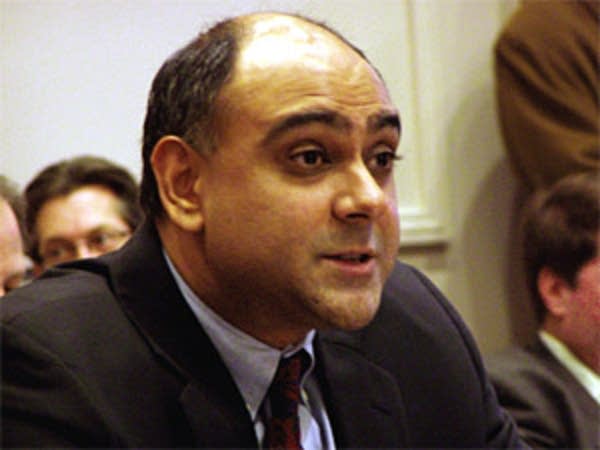Supporters try again to dedicate tax money to the outdoors
Go Deeper.
Create an account or log in to save stories.
Like this?
Thanks for liking this story! We have added it to a list of your favorite stories.

Several bills introduced in the House and Senate would dedicate a fraction of the state sales tax to protecting fish and game habitats. But just like previous sessions, some of the bills would also direct tax money to arts and humanities programs. That approach angers some sportsmen.
And some lawmakers still disagree over whether to raise the sales tax or use a portion of the existing tax.

Sportsmen have been working for the past decade to convince lawmakers to protect hunting and fishing resources. They want money dedicated through a constitutional amendment, which voters would have to approve on a statewide ballot.
This year, the Minnesota Senate is considering eight different proposals for an outdoors amendment. Sen. Satveer Chaudhary, DFL-Fridley, the chairman of the environment and natural resources committee, is the chief author of one of the bills. He says passage is critical this session.
Turn Up Your Support
MPR News helps you turn down the noise and build shared understanding. Turn up your support for this public resource and keep trusted journalism accessible to all.
"If we are going to clean up our waters, if we're going to protect our forests, if we're going to make way for greater outdoor recreation in the future, then we need to secure funding for environmental and our outdoor future," said Chaudhary.
Chaudhary's bill would increase the state sales tax by one-quarter of 1 percent. The estimated new revenue of $194 million would protect and enhance fish and wildlife habitat. Park, trails and zoos would also benefit.

But three bills spread the money further, to include arts and cultural resources. Public broadcasting operations, including Minnesota Public Radio, would also benefit under those Senate bills.
Sen. Richard Cohen, DFL-St. Paul, told a Senate committee last week that the arguments for preserving the state's natural resources are the same for preserving artistic and cultural resources.
"Surely both areas have been significantly underfunded. Both areas stand to be at great risk in terms of continuing to provide that quality of life," said Cohen.
Several arts advocates testified on behalf of Cohen's bill and two others, including one version that would raise the sales tax by three-eighths of 1 percent. Carolyn Bye of the Metropolitan Regional Arts Council said arts groups throughout the state need stable funding.
Our arts organizations need the increased revenue in order to provide security for the their continued existence.
"The revenue from this amendment would be an investment in the cultural life of our citizens in every Minnesota community -- an investment that they want," said Bye. "Our arts organizations need the increased revenue in order to provide security for the their continued existence."
The outdoors vs. the arts debate ultimately sank the legislation last year, and could be a similar problem this time.
Jim Klatt, president of the Minnesota Outdoor Heritage Alliance, says most sportsmen favor a simple bill that makes sense to voters. Their preference is one-eighth of 1 percent for hunting and fishing habitat, clean water and trails.
"Nobody says that we don't like the arts. I go to theater all the time, and every hunter I know goes to a play with their kids or they go somewhere. That's not the issue," said Klatt. "The issue is will the ... voters support a bill that has all that stuff on it. And we're just not sure that they will."
Still, Klatt says he remains optimistic a bill will pass this session. A Senate committee could vote later this week on a bill that blends the competing approaches.

Just one outdoors amendment bill has surfaced so far in the Minnesota House. Rep. Tom Hackbarth, R-Cedar, is taking an approach similar to the one he tried last year.
Instead of raising the sale tax, Hackbarth's bill dedicates one-eighth of 1 percent of existing sales tax revenue. And unlike Sen. Cohen's approach, the money would go only for fishing and hunting habitat. Hackbarth predicts another legislative mess ahead.
"I'm not going to support a bill to get my small portion for hunting and fishing and wildlife habitat and conservation, and then end up spending a lot more money and raising a tax to fund a lot of other issues. That's not where I'm at. That's not what I'm all about," said Hackbarth. "And I don't think the hunters and fishermen should be used to sell a bill that has everything except what they need."
If discussions hit an impasse this session, legislative leaders could set aside the measure until next year, since the earliest a proposed constitutional amendment could be on the ballot is November 2008.
A constitutional amendment bill does not require the governor's signature.
Dear reader,
Political debates with family or friends can get heated. But what if there was a way to handle them better?
You can learn how to have civil political conversations with our new e-book!
Download our free e-book, Talking Sense: Have Hard Political Conversations, Better, and learn how to talk without the tension.




